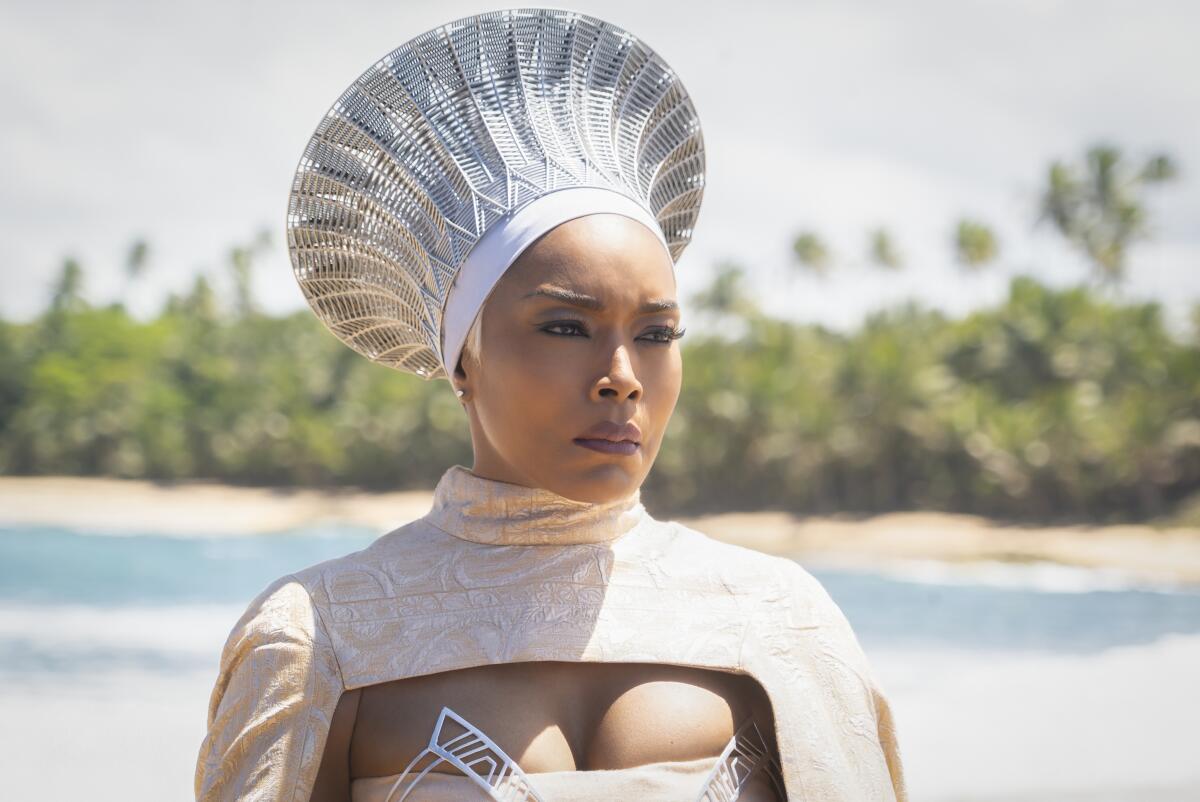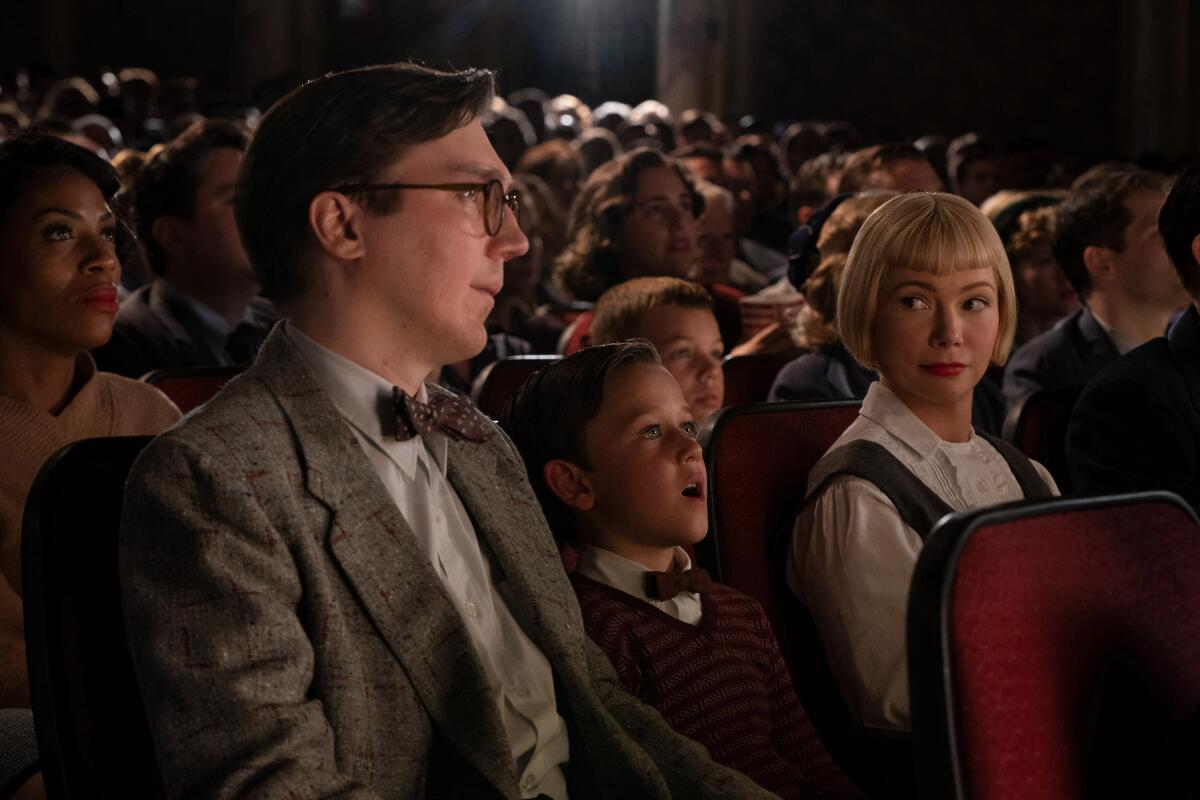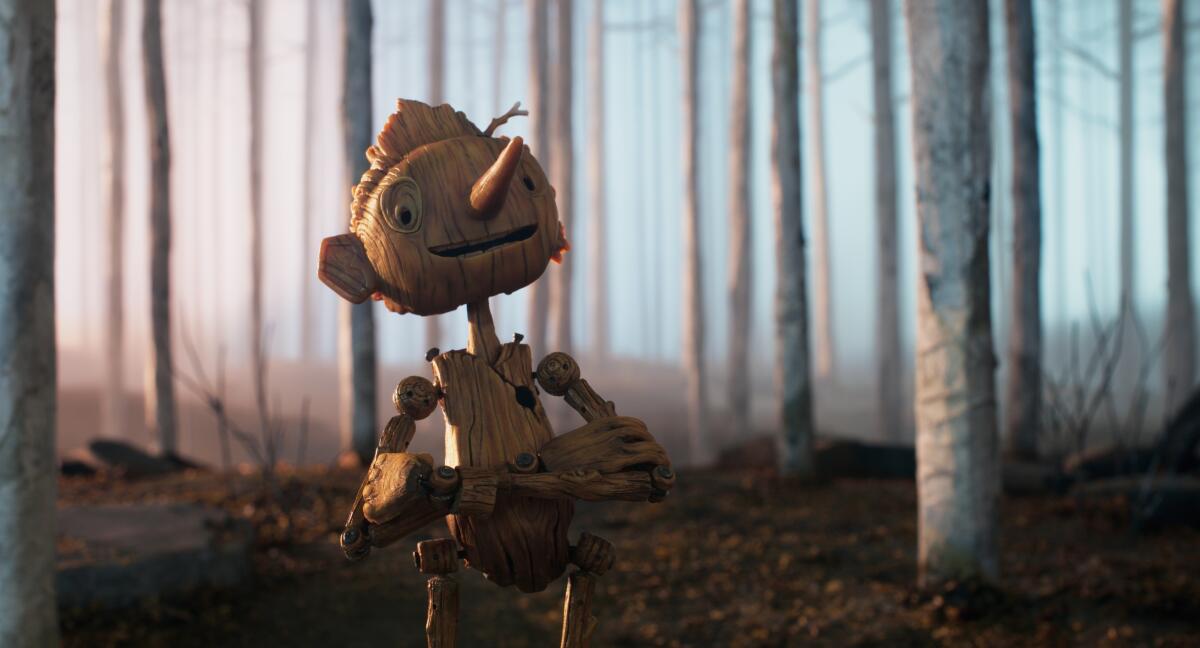Surviving grief on screen and off in ‘Black Panther: Wakanda Forever’

Hello! I’m Mark Olsen. Welcome to another edition of your regular field guide to a world of Only Good Movies.
Only good movies
Get the Indie Focus newsletter, Mark Olsen's weekly guide to the world of cinema.
You may occasionally receive promotional content from the Los Angeles Times.
The battle for “The People’s Joker” Jen Yamato has been tracking the saga of Vera Drew’s “The People’s Joker” ever since it premiered at the Toronto International Film Festival and was promptly pulled from other festivals due to pressure from Warner Bros. over the film’s use of characters such as the Joker, Batman and Harley Quinn. Drew has reimagined their universe into a tale of queer identity and self-discovery.
“I made this movie to process my childhood as somebody for whom gender-affirming healthcare could have saved my life. It could have saved me decades’ worth of mental anguish,” Drew said. She added, “I am doing this because I love these characters, and I feel like this is a version of the story that hasn’t been told yet and is long overdue.”
“Hollywood Chinese: The First 100 Years” The Academy Museum has an ongoing series examining onscreen depictions of Chinese culture and spotlighting Chinese and Chinese American artists from the first 100 years of Hollywood. Saturday will feature William Worthington’s 1919 silent film, “The Tong-Man,” which sparked a lawsuit for its negative depiction of Chinese people. Also screening will be Michael Cimino’s 1985 film, “Year of the Dragon,” which drew controversy and protest for its depictions, to be generous, of racism and sexism. A conversation with Dennis Dun and Renee Tajima-Peña will happen prior to the screening of “Year of the Dragon,” while Michael Mortilla will provide piano accompaniment for “The Tong-Man.”
Kathleen Collins’ “Losing Ground” On Sunday, the American Cinematheque will begin a limited run of the new 4K restoration of Kathleen Collins’ 1982 film, “Losing Ground,” among the first American features directed by a Black woman. Collins died in 1988 at age 46, before the film had any kind of release beyond scattered film festival screenings, and its rediscovery over the last few years has been a joy and inspiration. An insightful, semiautobiographical story of a woman discovering her artistic voice, with tender performances by Seret Scott and Bill Gunn, the film was selected for the National Film Registry in 2020.
Enjoying this newsletter? Consider subscribing to the Los Angeles Times
Your support helps us deliver the news that matters most. Become a subscriber.
‘Black Panther: Wakanda Forever’
Directed and co-written by Ryan Coogler, “Black Panther: Wakanda Forever” is the sequel to 2018’s “Black Panther,” which became a worldwide box-office hit and, more vitally, a cultural landmark. The death in 2020 of the film’s star, Chadwick Boseman, meant Coogler and his collaborators had to scramble and regroup in making the sequel. The cast features returning cast members including Letitia Wright, Angela Bassett, Danai Gurira, Winston Duke and Lupita Nyong’o and newcomers Tenoch Huerta and Michaela Coel. The film’s story finds the people of Wakanda at odds with the underwater kingdom of Talokan, another source of the precious material known as Vibranium. The movie is in theaters now.
For The Times, Justin Chang wrote, “from the opening scenes of ‘Black Panther: Wakanda Forever,’ director Ryan Coogler’s tact, intelligence and discernment are more than apparent. He wants to honor — without exploiting — Boseman’s memory, and he knows that he doesn’t have to push hard to earn our tears. He also knows that, as a matter of narrative opportunity as well as philosophical principle, every end really is a beginning. And so even as he guides us on a hushed procession through the streets of Wakanda and through a series of eerily beautiful funeral rites, Coogler maintains unflagging forward momentum and quickly puts a grief-stricken empire on high alert. There are already new adventures — and yes, fresh occasions for grief — on the horizon.”
Tracy Brown spoke to the Mexican actor Huerta about his role as Namor, the first Indigenous, Latin American superhero in the MCU. “‘Black Panther’ moved a lot of people, a lot of hearts,” says Huerta. “It helped people to be proud of who they are. … I hope ‘Wakanda Forever’ can help the people, especially in Latin America, the brown-skinned people, to look at themselves in the mirror and say, ‘This is who I am and I’m proud.’”
For Vulture, Angelica Jade Bastién wrote, “To say the film is overtaxed is an understatement. Regrettably, ‘Black Panther: Wakanda Forever’ tries to do so many things that it comes across as threadbare and pallid — less a failure of imagination and more of circumstance, time, and narrative constraints. … It is neither developed enough narratively nor complex enough politically. It is a film not about Blackness or Indigenous identity, though it hides behind the sheen of both. Coogler is a strong director still relatively early in his career, but his voice isn’t evolving as much as it’s rattling inside the morass of the ever-growing MCU. Who does Coogler want to be as an artist? What does he have to say about humanity? ‘Black Panther: Wakanda Forever’ doesn’t have the answers.”
For RogerEbert.com, Robert Daniels wrote, “while the film is messy, you’re relieved that it begins and ends on the right foot. That is, until the saccharine post-credit scene. I’m not sure what Coogler was thinking. He had more weight on him for this movie than any filmmaker deserves. But when this scene occurred, I audibly groaned at what amounts to a weepy, treacly moment that’s wholly unnecessary, emotionally manipulative, and partially unearned. It’s one of the many instances where ‘Black Panther: Wakanda Forever’ might have its heart in the right place but is in the wrong mindset and in the worst space—at the center of a contrived cinematic universe—to mourn on its own terms.”
For Rolling Stone, K. Austin Collins wrote, “It is a grim movie, in many ways, with a darker visual range than its predecessor and an overall heaviness that makes some of its forays into Marvel ensemble banter hit a little strangely. (Still, the occasional comic relief is welcome.) The tactical side of things doesn’t always pan out. Some of its huge, militaristic battles risk striking an oddly impersonal note in the midst of a movie whose stakes are carved out in such personal terms. The talking is often sharper than the fighting, which can get muddled. Coogler — whose best movie might still be ‘Creed’ — is good at everything, but ‘Wakanda Forever’ finds him excelling most in scenes like our first encounter with Namor, in an attack on an underwater mining mission, a sequence that’s all about the setup, about dredging up a sense of mystery. The movie isn’t always on such sure footing. But that’s almost appropriate: a messier movie trying to reckon with a messier range of feelings.”

Enjoying this newsletter? Consider subscribing to the Los Angeles Times
Your support helps us deliver the news that matters most. Become a subscriber.
‘The Fabelmans’
Directed and co-written by Steven Spielberg, “The Fabelmans” is based on the filmmaker’s own childhood and the story of how he discovered himself as an artist in the aftermath of his parents’ divorce. Starring Michelle Williams and Paul Dano as the parents, Gabriel LaBelle as Spielberg’s main stand-in and Judd Hirsch and Seth Rogen in supporting roles, the film is in theaters now.
For The Times, Justin Chang wrote, “For a filmmaker to use his command of the medium to dramatize his younger self’s command of the medium might have seemed, in other hands, hopelessly self-congratulatory. … But there’s also a humility at work here, as well as a deep understanding of human frailty that feels like the opposite of arrogance. The most powerful moments in ‘The Fabelmans’ unfold sans self-consciousness or formal gimmickry, which is fitting, since the most important lesson that Sammy learns about the movies is that, while they can spin elaborate lies, they can also tell the truth. His camera can both distort and reveal reality, catching details that the human eye misses and bringing them, unsparingly, into the light.”
For the New York Times, Manohla Dargis wrote, “‘The Fabelmans’ is, as the title says, somewhat of a fable and wonderful in both large and small ways, even if Spielberg can’t help but soften the rougher, potentially lacerating edges. It’s what he does; it’s also what the audience expects of him, and he’s nothing if not obliging. … But anyone who knows movies knows better: Spielberg has always been someone to take seriously. The proof has also always been onscreen, and still is. He will always err on the side of entertainment, I think, and will invariably try to make us weep so that he can dry our tears. I’ve chafed against that impulse of his, at times, even while falling for his movies. But it’s what he does, beautifully.”
For Vanity Fair, Richard Lawson wrote, “Not all memoir is generous. It can be intriguingly solipsistic, or maddeningly vain. But because there’s always been a curious blankness to Spielberg’s public persona—cheerful and engaged but never quite known—’The Fabelmans’ does feel like something of a gift. So many people, for so many years, have grafted themselves onto Spielberg’s films, structured whole childhoods around them, held them as emblems of magic and majesty. And now, at long last, Spielberg politely shares something of himself, too: a reciprocal response to these decades of conversation that says, Here’s where it all came from, the last piece of the mosaic.”

‘Guillermo del Toro’s Pinocchio’
Co-directed by Guillermo del Toro and Mark Gustafson, the stop-motion-animated film “Guillermo del Toro’s Pinocchio” features a voice cast including Ewan McGregor, Finn Wolfhard, Cate Blanchett, John Turturro, Ron Perlman, Tim Blake Nelson, Christoph Waltz and Tilda Swinton in retelling Carlo Collodi’s story of a wooden puppet who comes to life. The film is in theaters now and will begin streaming on Netflix on Dec. 9.
For The Times, Robert Abele wrote, “Is it any wonder that the choice of stop-motion for ‘Guillermo del Toro’s Pinocchio’ is just the modeling magic this tale needs to feel new-old again? Combining a darker tone closer to Collodi’s spirit with a commedia dell’arte sensibility regarding familiar elements and bizarre tangents, Del Toro, his co-screenwriter Patrick McHale and co-director Mark Gustafson — a stop-motion veteran getting his first feature credit — have made more of a Frankenstein-ed fairy tale than some irreverent answer to the Mouse House’s 1940 hand-drawn classic. That’s a good thing. Sometimes an odd, awkward thing, and at times a naggingly modern thing, but mostly a good thing.”
For IndieWire, Rafael Motamayor wrote, “In several ways, ‘Pinocchio’ is a giant middle finger to the Disneyfication of both the original Carlo Collodi story, and of fairy tales in general. Though this is a movie the whole family can see and get something out of, it never tones down the story for kids, nor does it talk down to them. … And yet, ‘Pinocchio’ is far from a sour or bleak film. It’s about the beauty of life being fleeting, a movie not about a monster who wants to be a real boy, but about a monster that wants his creator to love him the way he is, and to be accepted for who he is. This is a movie about imperfect fathers and imperfect sons, about not meeting expectations, and learning to live with them, about accepting that life ends, that loved ones will leave us, and about embracing the time we had together. There’s horror, sure, but also warmth, laughs, and plenty of songs.”

Only good movies
Get the Indie Focus newsletter, Mark Olsen's weekly guide to the world of cinema.
You may occasionally receive promotional content from the Los Angeles Times.




